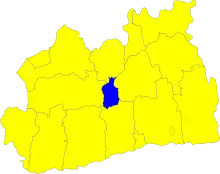Effingham Hundred
Effingham Hundred or the Hundred of Effingham was a hundred[1] but often treated as a half-hundred with that of Copthorne (to the east and north-east) and was the smallest in Surrey, England.

History
From a date before the Tudor period until its end it was connected with Copthorne Hundred, and so was sometimes styled and treated as the Half-hundred of Effingham.[2] It contained the smallest amount of land in Surrey, at 47 to 50 hides.[3]
In the Domesday Book of 1086, Effingham Hundred included the above and two unknown settlements of Driteham and Pechingeorde.[3]
It was a royal hundred, and in a document of the reign of Edward I is stated to have been farmed by all its various owners altogether formerly for half a mark per annum, but then for 1010s.
In minor civil dispute settlement, in 1628 the borough of Kingston received a grant of jurisdiction within the "hundred of Copthorne and Effingham" in compensation for their loss of the privilege of court leet in Richmond and Petersham and this grant was confirmed by Charles I to in 1638, and as the last vestige of the hundred's influence held good until late 19th century reforms.[3]
References
- Surrey hundreds
- E.W. Brayley (1841). A topographical history of Surrey. Tilt and Bogue. pp. 337–338. Retrieved 30 April 2012.
- H.E. Malden, ed. (1911). "The hundred of Effingham: Introduction and map". A History of the County of Surrey: Volume 3. Institute of Historical Research. Retrieved 6 January 2014.